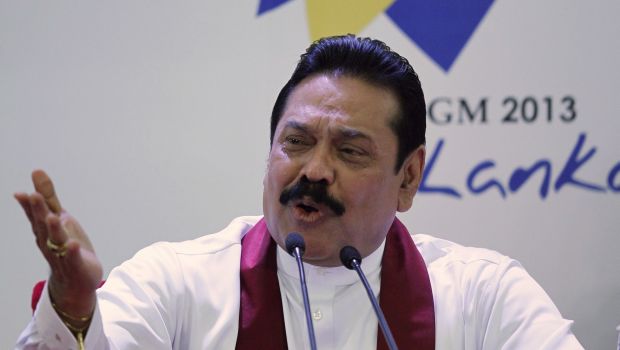
Sri Lanka’s President Mahinda Rajapaksa speaks during a pre-CHOGM (Commonwealth Heads of Government Meeting) news conference in Colombo November 14, 2013. (REUTERS/Dinuka Liyanawatte)
President Mahinda Rajapaksa was speaking on the sidelines of a summit for the 53 nations in the Commonwealth of Britain and its former territories. The group has been accused of making a mockery of its core values of democracy and human rights by holding this year’s summit in the seaside capital of Colombo. The summit host generally chairs the Commonwealth for two years until the next summit.
“We are open. We have nothing to hide,” Rajapaska said, despite so far refusing demands by world governments and the United Nations for an independent investigation into alleged atrocities committed by both rebels and soldiers during the war.
“If anyone who wants to complain about human rights violations in Sri Lanka, whether it’s torture, whether it is rape, we have a system,” Rajapaksa said. “If there is any violations, we will take actions against anybody, anybody. I am ready to do that.”
The leaders of Canada, India and Mauritius have stayed away. Other leaders, including British Prime Minister David Cameron, have been forced by rights groups to justify their attendance by promising to call Sri Lanka to task.
Commonwealth Secretary-General Kamalesh Sharma defended having the summit in Colombo by saying it allows Sri Lanka to meet with leaders who have dealt with issues of human rights, rule of law and judicial independence in their countries. He said “it shows the Commonwealth in action.”
Since the war ended in 2009 with Sri Lanka’s Sinhalese-dominated armed forces smashing a sustained ethnic Tamil rebellion for an independent homeland, the government has denied that its side committed any rights abuses.
It accuses journalists of fabricating allegations of atrocities, and rejects criticism of nepotism, even though five ministries are controlled by Rajapaksa and his three brothers. The parliament is also dominated by Rajapaksa’s coalition.
On Thursday, Rajapaksa again lauded the war victory, saying “people were getting killed for 30 years. At least after 2009 we have stopped it.”
Yet postwar reconciliation remains a far-off goal. Troops are still heavily deployed throughout the northern Tamil heartland in the teardrop-shaped island off southwest India, and local journalists still regularly report harassment. Provincial elections in September were seen as a step toward granting Tamils more autonomy, but also drew criticism for falling far below what is needed for reconciliation.
On Tuesday, a British documentary maker was blocked by pro-government protesters from traveling by train to the north.
A court on Thursday banned protests in Colombo until the end of the Commonwealth summit, police spokesman Ajith Rohana said, explaining that the move was intended to prevent traffic jams.
The main opposition United National Party also said it was forced to cancel a candlelight vigil Thursday and take down an exhibition of human rights-related photographs, documents and artwork at its headquarters after several hundred pro-government protesters swarmed the building Wednesday and attacked a vehicle carrying the party’s leader.
“We are extremely surprised,” said spokesman Mangala Samaraweera. “We thought that now, at least, by becoming the chair of the Commonwealth, the government would adhere to the charter” and its provisions for democracy and human rights. “But they seem to be continuing to violate these principles with impunity.”
